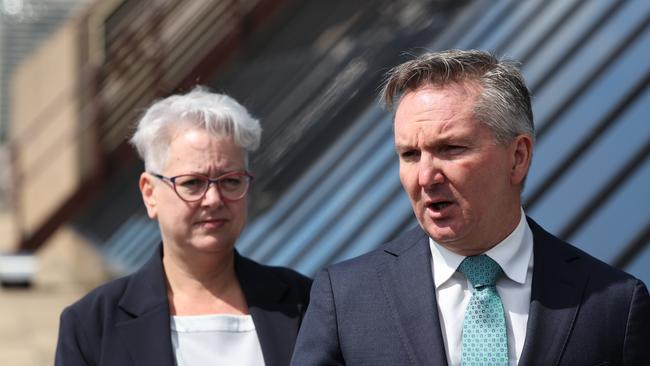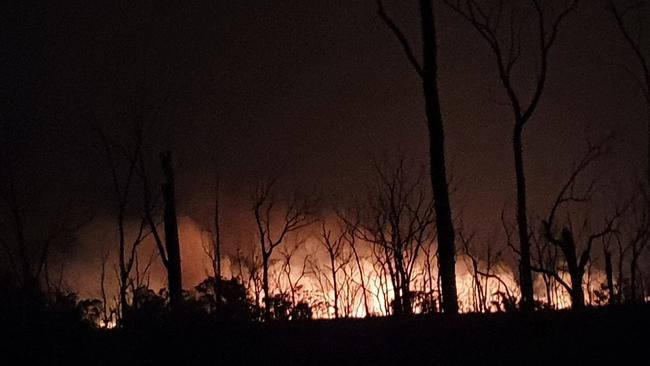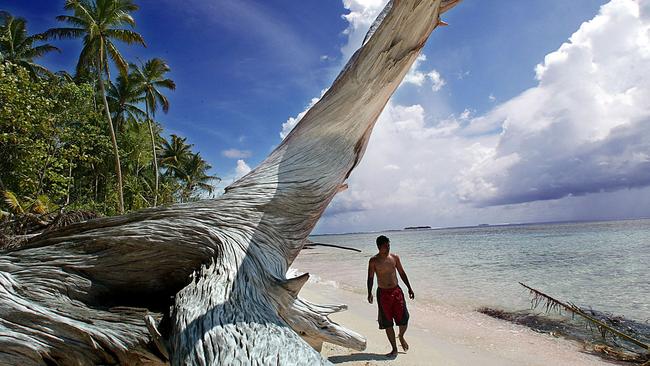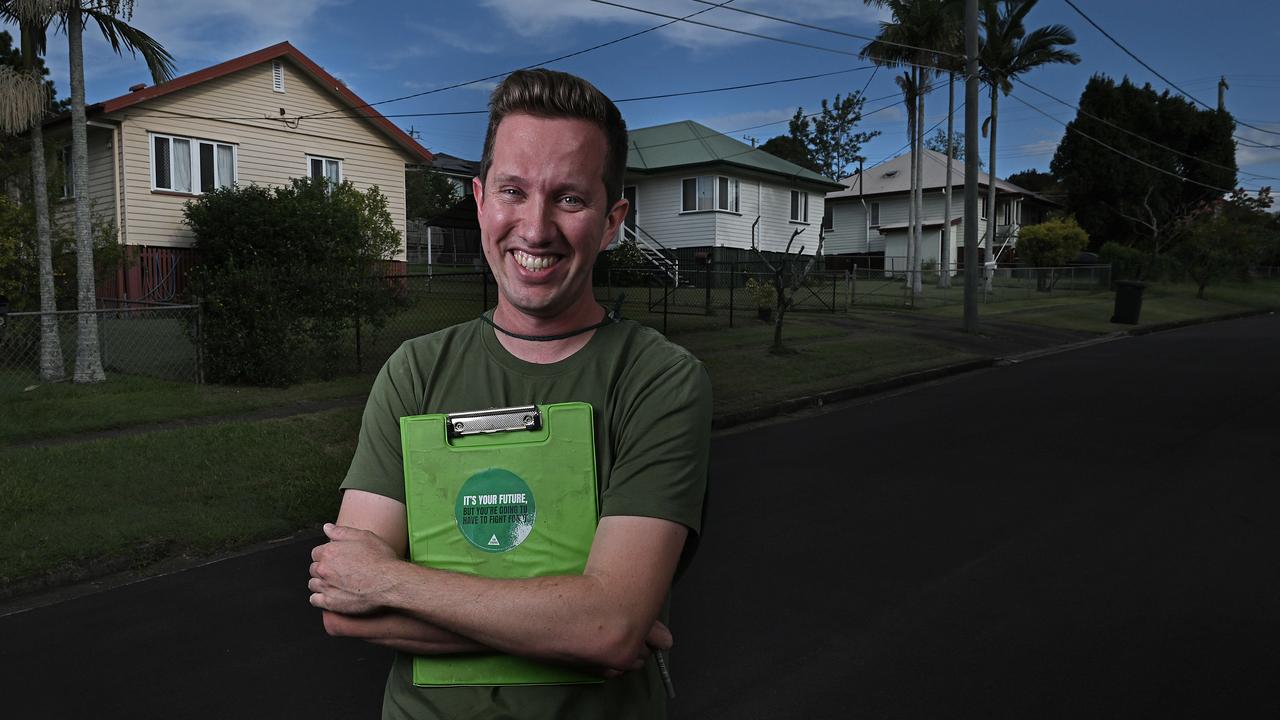Climate threat to power grid and regional stability
Chris Bowen’s warning in Thursday’s annual climate change statement tabled in parliament comes as severe weather events increase threats of global political instability.

Climate Change and Energy Minister Chris Bowen will warn hostile actors could weaponise climate change to potentially sabotage Australia’s “fragile” energy networks, as severe weather events increase threats of global political instability and intrastate conflict, population displacement and extremist activity.
With China expanding its footprint and influence in Southeast Asia and the South Pacific, Australian officials have adopted a proactive approach in supporting regional neighbours headlined by the Australia-Tuvalu Falepili Union announced by Anthony Albanese.
The Australian understands the updated security warnings were informed by a declassified snapshot of work into climate change security risks by the Office of National Intelligence.
The annual climate change statement tabled in parliament on Thursday includes advice warning “climate change is likely to accentuate economic factors” fuelling disruptive protests, water shortages, higher food prices, energy price spikes and infrastructure failure.
Mr Bowen on Thursday will say “national security threats from climate change already present serious risks to Australia and the region, but they will become more severe and more frequent the further warming targets are exceeded”.
Mr Bowen, who will fly to Dubai next week to attend the United Nations COP28 summit, will say “extreme weather events caused by climate change place increased strain on Australia’s energy networks and this fragility could be used by hostile actors”. Chinese state-sponsored cyber actors have previously been linked to targeted attacks on Australian critical infrastructure.

The climate change statement said natural disasters were exacerbating risks to the power grid, with coal-fired power plants shut down by floods, transmission lines threatened by bushfires and hydro-electric generation and coal plants affected by drought.
“These events place increased strain on Australia’s energy networks, and this fragility could be used as a climate change-based force multiplier for hostile actors. The threshold for damage to Australia’s energy networks from sabotage may be significantly lower during high demand/low supply periods, such as extreme weather seasons,” the statement said.
“Infrastructure failure, extremist activity and disruptive protests could compound the impacts of disasters, water shortages or food and energy price spikes, and further erode some countries’ political legitimacy. This would likely diminish their capacity to address the challenges they face, and increase the risk of conflict as countries compete for increasingly scarce resources.”
Mr Bowen, who on the weekend announced Labor’s 43 per cent emissions reduction by 2030 target was tracking 1 per cent short, according to updated projections, said dealing with climate extremes would heap stress on crisis management and stretch “Australia’s emergency capabilities that deploy domestically and internationally”.
“Climate change is an existential national security risk to our Pacific partners and presents unprecedented challenges for our region. Nations most vulnerable to sea level rise are likely to look to Australia and other countries for closer economic integration, including through expanded circular labour mobility schemes and longer-term options for mobility with dignity,” Mr Bowen will say. After Australia and the US last year agreed to share assessments and advice on regional security risks posed by climate change, Mr Bowen will say the national security imperative “adds to the need for strong action this decade, and reinforces the importance of our domestic transformation and international engagement”.
As the government counters Chinese influence in the South Pacific, the annual statement says “climate change is likely to worsen global problems caused by rapid population growth, corruption, poor governance, weak infrastructure and conflict”.
“Additionally, nations most vulnerable to sea level rise are likely to look to Australia and other countries for closer economic integration, including through migration and expanded labour schemes.”
The Albanese government’s Falepili Union, allowing citizens of Tuvalu who face increasing threats from climate change to live, work and study in Australia, has come under domestic pressure in the tiny Pacific nation.

Former Tuvalu department of foreign affairs official Jess Marinaccio on Wednesday wrote in the Australian National University’s Devpolicy Blog that Tuvalu’s opposition party had “raised numerous questions about the union, including whether it had been approved by Cabinet and why it had not been submitted to consultation with the people Tuvalu”.
“Opposition members noted there was widespread confusion among members of the public about what the union entailed,” Ms Marinaccio wrote.
Opposition energy spokesman Ted O’Brien labelled Mr Bowen as a “false prophet who’s big on promises that never eventuate”, declaring the government was failing against its own targets and commitments on energy prices, emissions, electric vehicles and renewables.
The Liberal frontbencher, who is heading to the COP28 summit to spruik nuclear energy, will attack Labor’s failure to deliver a “reliable electricity grid” in his parliamentary response to Mr Bowen.
“In practice, its unprecedented market interventions are killing off gas supply with dire shortfalls emerging and investment all but stalled,” Mr O’Brien will say.
“Meanwhile, they refuse to do anything about 80 per cent of baseload power stations exiting the grid by 2035. They’re in denial.
“Is it any wonder that our grid is now in constant crisis mode with the market operator sounding the warning bell that brownouts and blackouts may come as early as this summer.”
The government is also facing Coalition accusations that Labor has “abandoned” its election promise to cut power bills for families and businesses by $275-a-year from 2025, after an updated energy plan removed any reference to the pledge.







To join the conversation, please log in. Don't have an account? Register
Join the conversation, you are commenting as Logout